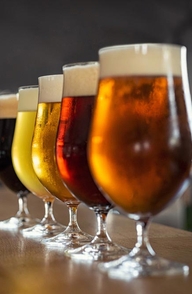Start 14-Day Trial Subscription
*No credit card required

Craft Breweries Embracing Tech for To-Go Orders
How Craft Breweries are Adopting Digital Innovations to Enhance To-Go Orders and Elevate Customer Experience
The craft beer industry, renowned for its dedication to quality and innovation, is now leveraging technology to enhance customer experience, especially in the realm of to-go orders. This shift is not merely a trend but a strategic adaptation to the evolving consumer landscape, where convenience and efficiency are paramount.
The Rise of Digital Ordering Systems
Digital restaurant ordering systems have become a cornerstone for many craft breweries. These systems streamline ordering, allowing customers to place orders via websites or mobile apps.
With declining consumption of beers and market saturation, technology is making a huge difference. One of the greater challenges is encouraging people to go out and visit their taprooms. Brewpubs, in particular, experienced a four percent decline in visits. As such, they must innovate and include technologies for order-to-go and delivery.
One of the leading examples is the implementation of user-friendly mobile apps. These apps enable customers to browse menus, customize orders, and even select specific pickup times. Moreover, they often include loyalty programs and personalized recommendations, enhancing customer engagement and satisfaction.
Leveraging E-Commerce Platforms
E-commerce platforms have also become crucial for craft breweries looking to expand their reach. Platforms like Shopify offer breweries the tools to set up online stores quickly. These platforms provide integrated payment solutions, inventory management, and analytics, allowing breweries to optimize their sales strategies.
Estimates show that the alcoholic drinks market will reach $25.7 billion. The ease of ordering and home delivery options have made e-commerce an indispensable tool for breweries aiming to cater to a broader audience.
Contactless Payments and QR Codes
At the height of the pandemic, contactless payments have become a standard expectation among consumers. Craft breweries have swiftly adopted this technology to ensure safety and convenience. QR codes for ordering and payment have also gained popularity. Customers can scan a QR code at the brewery to access the menu, place orders, and complete transactions without physical contact.
A study found that 80 percent of consumers believe contactless payments are cleaner and safer. This sentiment has driven breweries to adopt these technologies, leading to a smoother and more secure customer experience. Additionally, QR codes can be updated in real-time, allowing breweries to quickly change their menus and pricing. This is particularly useful for limited-edition brews and special offers.
Integrating AI and Data Analytics
Data analysis and artificial intelligence (AI) are transforming how craft breweries understand and cater to their customers. AI-driven insights can analyze customer preferences, purchasing behavior, and feedback, enabling breweries to tailor their offerings more effectively.
For instance, AI can predict which brews will likely be popular based on historical data and current trends, helping breweries optimize their inventory and reduce waste. This predictive capability ensures breweries can produce just the right amount of beer, minimizing excess and ensuring popular brews are always available.
In addition to optimizing inventory, AI is revolutionizing packaging in the craft beer industry. Smart packaging solutions, powered by AI, can monitor the freshness of beer, track its journey from brewery to consumer, and provide real-time updates.
For example, sensors embedded in packaging can alert both the brewery and the customer if the product has been exposed to unfavorable conditions. This ensures that patrons receive the best-quality product and enhances their trust in the brand.
Data analytics is also central to marketing strategies. Breweries can identify the most effective channels and campaigns by analyzing data from digital platforms. This targeted approach ensures higher engagement and conversion rates, as breweries can tailor their marketing efforts to reach specific demographics and customer segments.
For example, AI can help craft personalized marketing messages that relate to individual customers based on their past purchases and preferences, increasing the likelihood of repeat business.
Enhanced Customer Experience Through Augmented Reality
Augmented Reality (AR) is another technology that craft breweries are beginning to explore. AR can boost the customer experience by providing interactive and immersive elements. For example, customers can leverage their smartphones to scan a beer label and access detailed information about the brewing process, ingredients, and tasting notes.
Some breweries even use AR to offer virtual tours of their facilities, giving customers a behind-the-scenes look at the brewing process. This technology engages customers by making the experience more interactive and educational and fosters a deeper connection between the consumer and the brand.
AR's immersive capabilities transform a simple beer purchase into an informative journey, enhancing customer loyalty and encouraging repeat business. AR adds a unique dimension to the customer experience for craft breweries and is a powerful marketing tool, differentiating them in a competitive market where innovation is critical to standing out.
Craft a Technology-Based Brewing Process
Technology integration in the craft brewing industry is revolutionizing how breweries operate and interact with their customers. From digital ordering systems and e-commerce platforms to contactless payments and augmented reality, these advancements drive efficiency, enhance customer satisfaction, and open new avenues for growth.
Craft breweries that embrace these innovations will be well-positioned to succeed and thrive in an increasingly digital world. For consumers, this means more convenient access to their favorite brews, ensuring that the craft beer experience remains as enjoyable and engaging as ever.
Image by Freepik



